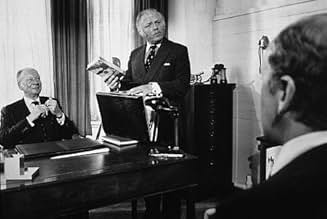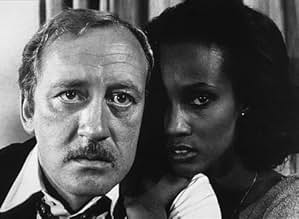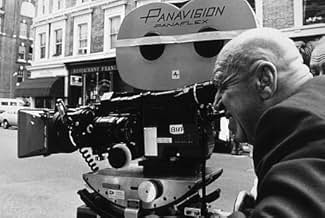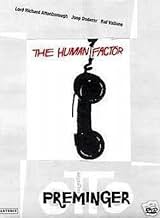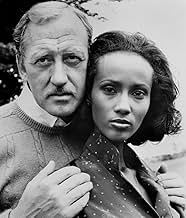IMDb-BEWERTUNG
6,1/10
1726
IHRE BEWERTUNG
Füge eine Handlung in deiner Sprache hinzuWhen a leak of information in the African section of British Intelligence is discovered, security man Daintry is brought in to investigate.When a leak of information in the African section of British Intelligence is discovered, security man Daintry is brought in to investigate.When a leak of information in the African section of British Intelligence is discovered, security man Daintry is brought in to investigate.
- Regie
- Drehbuch
- Hauptbesetzung
Empfohlene Bewertungen
The picture concerns the world of secrets agents and spies . Unexciting spy caper has a leak of information in the African section of British Intelligence , as a British Service agent betraying his country in order to aid a woman and a friend . The high-command fears he may be the leak to Moscow, and schemes to stop the damage permanently . Then Security man Daintry is brought in to investigate. As a result of his actions an innocent man is condemned to a fatal fate . Things go wrong when the responsible person is discovered and is forced to defect . Every man in love is a potential traitor !.
This interesting but low-key movie is a cold thriller plenty of suspense , mystery , plot twists , tension and top cast . The prospect of Tom Stoppard rendition a Graham Greene novel promises more than movie really offers , though darkly ironic tale of Foreign Office treason still throws up delights and twisted surprises . The casting is first-rate with a top-notch star-studded , including script by prestigious Tom Stoppard , though results are average. As the bulk of the formidable cast is pleasantly familiar in this engaging if slow-moving drama , including the following ones : Richard Attenborough , John Gielgud , Derek Jacobi , Robert Morley, Ann Todd , Richard Vernon , Tony Vogel , Fiona Fullerton, Adrienne Corri , Martin Benson . And no fault of the always splendid Nicol Williamson as a British double agent who is forced to defect to Russia , though he's billed eight in order alphabetic , but quite clearly has the central part , and surprisingly the gorgeous model Iman , David Bowie's wife, resulting to be an acting discovery by providing an nice performance.
Based on the novel by Graham Greene , almost all of his novels and five plays -including "Brighton Rock", "The Ministry of Fear" and "The End of the Affair"- , have been brought to the screen. A superb storyteller, he also wrote the screenplays for such classics as The fallen idol (1948) and The Third Man (1949). The flick belongs to spies sub-genre developed during ¨Cold war¨ and its maxim representations are John LeCarre's novels rendered to cinema in movies as ¨The spy who came in from cold¨ (by Martin Ritt with Richard Burton) , ¨The Kremlin Letter¨(John Huston with Nigel Green) and ¨Russia House¨(Fred Schepisi with Sean Connery) , these films get similar atmosphere and twisted intrigues about spies among East and west World but with no relation to spies from James Bond novels by Ian Fleming . The motion picture was professionally directed by Otto Preminger. His direction tends to to lack passion , robbing what what should be a thrilling story of some of the human factor of the title . The great filmmaker Otto Preminger made several successful and classic movies , such as : ¨Fallen Angel , Daisy Kenyon, Forever amber , Whirlpool, Angel face, The moon is blue, Carmen Jones , Court martial of Billy Mitchell, The man with the golden arm , Saint Joan, Bonjour Tristesse , Exodus , The cardinal, Advise and consent, Hurry sundown , Bunny Lake is missing , In harm's way¨, and this ¨The human factor¨ : Preminger's final film . Rating 6/10 . Watchable spy drama , but neither extraordinary , nor notable , but acceptable and passable . The story will appeal to suspense movies fans and people with adquired tastes .
This interesting but low-key movie is a cold thriller plenty of suspense , mystery , plot twists , tension and top cast . The prospect of Tom Stoppard rendition a Graham Greene novel promises more than movie really offers , though darkly ironic tale of Foreign Office treason still throws up delights and twisted surprises . The casting is first-rate with a top-notch star-studded , including script by prestigious Tom Stoppard , though results are average. As the bulk of the formidable cast is pleasantly familiar in this engaging if slow-moving drama , including the following ones : Richard Attenborough , John Gielgud , Derek Jacobi , Robert Morley, Ann Todd , Richard Vernon , Tony Vogel , Fiona Fullerton, Adrienne Corri , Martin Benson . And no fault of the always splendid Nicol Williamson as a British double agent who is forced to defect to Russia , though he's billed eight in order alphabetic , but quite clearly has the central part , and surprisingly the gorgeous model Iman , David Bowie's wife, resulting to be an acting discovery by providing an nice performance.
Based on the novel by Graham Greene , almost all of his novels and five plays -including "Brighton Rock", "The Ministry of Fear" and "The End of the Affair"- , have been brought to the screen. A superb storyteller, he also wrote the screenplays for such classics as The fallen idol (1948) and The Third Man (1949). The flick belongs to spies sub-genre developed during ¨Cold war¨ and its maxim representations are John LeCarre's novels rendered to cinema in movies as ¨The spy who came in from cold¨ (by Martin Ritt with Richard Burton) , ¨The Kremlin Letter¨(John Huston with Nigel Green) and ¨Russia House¨(Fred Schepisi with Sean Connery) , these films get similar atmosphere and twisted intrigues about spies among East and west World but with no relation to spies from James Bond novels by Ian Fleming . The motion picture was professionally directed by Otto Preminger. His direction tends to to lack passion , robbing what what should be a thrilling story of some of the human factor of the title . The great filmmaker Otto Preminger made several successful and classic movies , such as : ¨Fallen Angel , Daisy Kenyon, Forever amber , Whirlpool, Angel face, The moon is blue, Carmen Jones , Court martial of Billy Mitchell, The man with the golden arm , Saint Joan, Bonjour Tristesse , Exodus , The cardinal, Advise and consent, Hurry sundown , Bunny Lake is missing , In harm's way¨, and this ¨The human factor¨ : Preminger's final film . Rating 6/10 . Watchable spy drama , but neither extraordinary , nor notable , but acceptable and passable . The story will appeal to suspense movies fans and people with adquired tastes .
'Sr Moreno' dismisses the Preminger film adaptation of 'The human factor' very intemperately: The clincher of his argument - which consists largely in being rude to Iman (she was perfectly adequate in her role, and certainly believably a beauty whom a career diplomat might have risked his career for) - is Graham Greene's own declared dislike of Preminger's version.
While obviously his own direct collaboration with Carol Reed made 'The Third Man' into the definitive Greene adaptation for the screen, and a classic sans pareil, there is still no need to be unduly respectful of his impatience with this version of his 'The human factor.'
After all, Greene had a well-known falling-out with Mankiewicz during the filming of the 1959 version of 'The quiet American,' but no-one else thinks that was a bad movie!
Few filmed adaptations are entirely successful - probably without the original author's close collaboration they will inevitably be more-or-less diminished versions of the literary form. And while Grahame Greene was perfectly entitled, with the status of 'onelie true begetter' to be hyper-critical of any lesser recensions, that is not a sensible reason for the rest of us not to enjoy and appreciate what is a perfectly intelligent and involving film in its own right.
There are few enough thrillers around on the TV today which do not involve various forms of adolescent excitability and excess that I should have thought the BBC were perfectly justified in giving it an airing recently on their 'thoughtful' channel.
This is no 'The third man' to be sure - but then, what is? This remains a film with, clearly, much in it to admire.
Surely, if every film has to achieve the status of 'masterpiece' before it can be accepted at all - as 'Moreno' appears to believe - then would there not be a certain danger of an unbridgeable culture-gap developing between the extremes of 'art-house film' and 'teen-flick'? Fortunately, audiences - and film-makers - are still quite willing to 'give it a go,' even if the results are 'merely' intelligent, rather than the absolutely brilliant - and still quite rare - product of genius!
Really, I feel most strongly that 'Moreno''s strictures represent exactly the kind of intellectual snobbery which can only tend to alienate cinema audiences even further from any more sober and challenging films.
There really are enough points of worthwhile discussion raised by this film of 'The human factor' for it to be impossible to dismiss in a single paragraph of supercilious contempt: 'Terrible' does not amount to a review, but only to intemperate spleen, I'm afraid.
While obviously his own direct collaboration with Carol Reed made 'The Third Man' into the definitive Greene adaptation for the screen, and a classic sans pareil, there is still no need to be unduly respectful of his impatience with this version of his 'The human factor.'
After all, Greene had a well-known falling-out with Mankiewicz during the filming of the 1959 version of 'The quiet American,' but no-one else thinks that was a bad movie!
Few filmed adaptations are entirely successful - probably without the original author's close collaboration they will inevitably be more-or-less diminished versions of the literary form. And while Grahame Greene was perfectly entitled, with the status of 'onelie true begetter' to be hyper-critical of any lesser recensions, that is not a sensible reason for the rest of us not to enjoy and appreciate what is a perfectly intelligent and involving film in its own right.
There are few enough thrillers around on the TV today which do not involve various forms of adolescent excitability and excess that I should have thought the BBC were perfectly justified in giving it an airing recently on their 'thoughtful' channel.
This is no 'The third man' to be sure - but then, what is? This remains a film with, clearly, much in it to admire.
Surely, if every film has to achieve the status of 'masterpiece' before it can be accepted at all - as 'Moreno' appears to believe - then would there not be a certain danger of an unbridgeable culture-gap developing between the extremes of 'art-house film' and 'teen-flick'? Fortunately, audiences - and film-makers - are still quite willing to 'give it a go,' even if the results are 'merely' intelligent, rather than the absolutely brilliant - and still quite rare - product of genius!
Really, I feel most strongly that 'Moreno''s strictures represent exactly the kind of intellectual snobbery which can only tend to alienate cinema audiences even further from any more sober and challenging films.
There really are enough points of worthwhile discussion raised by this film of 'The human factor' for it to be impossible to dismiss in a single paragraph of supercilious contempt: 'Terrible' does not amount to a review, but only to intemperate spleen, I'm afraid.
A Cold War Tragedy
Great dialogue and characters. Nicol Williamson plays our hero. He does some brilliant and subtle work here. Always a pleasure to see him on the screen.
Iman plays his wife. Unfortunately, she is hopelessly outclassed by the rest of the cast which makes her okay performance look worse by comparison.
Robert Morley steals the show as the villainous doctor who gets more of a thrill from killing than healing people. He owns every scene he is in.
As for the plot and pacing, I have some criticism. Just as the main story start to pick up steam, there is an extended flashback in the middle of the film that derails the momentum. I wish they found a different way to present that information that didn't effect the pacing.
Great dialogue and characters. Nicol Williamson plays our hero. He does some brilliant and subtle work here. Always a pleasure to see him on the screen.
Iman plays his wife. Unfortunately, she is hopelessly outclassed by the rest of the cast which makes her okay performance look worse by comparison.
Robert Morley steals the show as the villainous doctor who gets more of a thrill from killing than healing people. He owns every scene he is in.
As for the plot and pacing, I have some criticism. Just as the main story start to pick up steam, there is an extended flashback in the middle of the film that derails the momentum. I wish they found a different way to present that information that didn't effect the pacing.
Not being familiar with the source material upon which this is based, I worried that i would have a hard time following the various plot entanglements upon learning it was based on a rather knotty British spy novel but the screenplay makes everything that is happening (and why) more or less clear enough for someone just catching it randomly (like i did) to get.
Film's first half is really quite good. It takes you into the cold and somewhat distant world of this quite average bureaucrat's office and then home life (wherein you learn that he's being suspected of leaking top secret info--"very unimportant top secret info" as one of the characters making these allegations says--but top secret none the less.) Film really captures and sustains a very solid tone of slow growing mistrust by everyone in the film. Nicol Williamson's character realizes he's under suspicion right away but the various other characters' slow burning distrust of one another grows rather nicely as the film goes on. (In true British spy film tradition tho none of them ever seem to voice their distrust of one another to each other, choosing instead calmly and carefully constructed parables of being trapped in boxes within boxes.) As Nicol Williamson somewhat slowly tries to put together a plan to quiet his superior's suspicions about him and keep his wife and adopted son safe, everything around him naturally falls apart and the film's narrative somewhat suffers from having to keep clear the reasons why Williamson is doing what he's doing as well as what his superior's are up to (and why they too are doing what they're doing) It doesn't help that the film without much warning about halfway through flashes back to Williamson's time in Africa when he first met and began an affair with the woman who would come to be his wife---that part is of course supposed to explain Williamson's motivation and give you some idea of what's at stake--but because of its rather abrupt happening, you never really feel much except for confusion, especially once the film just as arbitrarily jumps back to present day.
Film's last half hour or so gets somewhat jumbled and almost completely loses the nice quiet momentum it had been steadily building up---jumbled as in i'm not entirely sure what exactly happened but I get the main idea regardless. I won't spoil the events that happen but I will say that the big event that happens at film's end certainly doesn't feel like a big event, nor does it feel like a very satisfactory ending. Perhaps the novel was able to end this way because it was able to leave you with the proper sense that the main character's feelings on what is happening to him was resolved more or less, but the film literally leaves you hanging for much, much more closure on behalf of the fate of one Maurice Castle.
That said there are some wonderful details featured throughout. From Robert Morley's delicious performance as the devious doctor whom the section employs for "physicals" of its employees, to the wedding reception at the easily cowed secion chief Richard Attenborough's house (wherein his shrew of an ex wife completely chastises him for breaking her precious ceramic owls) to the painting of boxes decorating the hotel walls where the villains meet in the first half to discuss what is to be done with their suspects to just about every scene featuring Derek Jacobi as the heavy drinking/no sweat colleague of Castle, there is much to be savored and enjoyed here...just don't expect any action or actual resolutions to the film's various plot points.
Film's first half is really quite good. It takes you into the cold and somewhat distant world of this quite average bureaucrat's office and then home life (wherein you learn that he's being suspected of leaking top secret info--"very unimportant top secret info" as one of the characters making these allegations says--but top secret none the less.) Film really captures and sustains a very solid tone of slow growing mistrust by everyone in the film. Nicol Williamson's character realizes he's under suspicion right away but the various other characters' slow burning distrust of one another grows rather nicely as the film goes on. (In true British spy film tradition tho none of them ever seem to voice their distrust of one another to each other, choosing instead calmly and carefully constructed parables of being trapped in boxes within boxes.) As Nicol Williamson somewhat slowly tries to put together a plan to quiet his superior's suspicions about him and keep his wife and adopted son safe, everything around him naturally falls apart and the film's narrative somewhat suffers from having to keep clear the reasons why Williamson is doing what he's doing as well as what his superior's are up to (and why they too are doing what they're doing) It doesn't help that the film without much warning about halfway through flashes back to Williamson's time in Africa when he first met and began an affair with the woman who would come to be his wife---that part is of course supposed to explain Williamson's motivation and give you some idea of what's at stake--but because of its rather abrupt happening, you never really feel much except for confusion, especially once the film just as arbitrarily jumps back to present day.
Film's last half hour or so gets somewhat jumbled and almost completely loses the nice quiet momentum it had been steadily building up---jumbled as in i'm not entirely sure what exactly happened but I get the main idea regardless. I won't spoil the events that happen but I will say that the big event that happens at film's end certainly doesn't feel like a big event, nor does it feel like a very satisfactory ending. Perhaps the novel was able to end this way because it was able to leave you with the proper sense that the main character's feelings on what is happening to him was resolved more or less, but the film literally leaves you hanging for much, much more closure on behalf of the fate of one Maurice Castle.
That said there are some wonderful details featured throughout. From Robert Morley's delicious performance as the devious doctor whom the section employs for "physicals" of its employees, to the wedding reception at the easily cowed secion chief Richard Attenborough's house (wherein his shrew of an ex wife completely chastises him for breaking her precious ceramic owls) to the painting of boxes decorating the hotel walls where the villains meet in the first half to discuss what is to be done with their suspects to just about every scene featuring Derek Jacobi as the heavy drinking/no sweat colleague of Castle, there is much to be savored and enjoyed here...just don't expect any action or actual resolutions to the film's various plot points.
Nicol Williamson remains restrained throughout the film, yet his face is so expressive that it does mirror the emotions and thoughts of his character. His admirable performance elevates this otherwise flat, talky thriller, which definitely tries to be a non-taditional spy drama, in the spirit of "The Ipcress File", but doesn't even have the elementary excitement we expect from the genre. (**)
Wusstest du schon
- WissenswertesAuthor Graham Greene said of his novel "The Human Factor" in his 1980 autobiography "Ways of Escape" that it was "to write a novel of espionage free from the conventional violence, which has not, in spite of James Bond, been a feature of the British Secret Service. I wanted to present the Service unromantically as a way of life, men going daily to their offices to earn their pensions."
- PatzerIn the South African scenes (filmed in Kenya), the cars have Kenyan registration plates.
- Zitate
Maurice Castle: [referring to Davis] He calls all children "little bastards".
Top-Auswahl
Melde dich zum Bewerten an und greife auf die Watchlist für personalisierte Empfehlungen zu.
- How long is The Human Factor?Powered by Alexa
Details
- Erscheinungsdatum
- Herkunftsland
- Offizielle Standorte
- Sprache
- Auch bekannt als
- The Human Factor
- Drehorte
- Produktionsfirmen
- Weitere beteiligte Unternehmen bei IMDbPro anzeigen
Box Office
- Budget
- 5.500.000 $ (geschätzt)
- Bruttoertrag in den USA und Kanada
- 376.050 $
- Weltweiter Bruttoertrag
- 376.050 $
Zu dieser Seite beitragen
Bearbeitung vorschlagen oder fehlenden Inhalt hinzufügen


